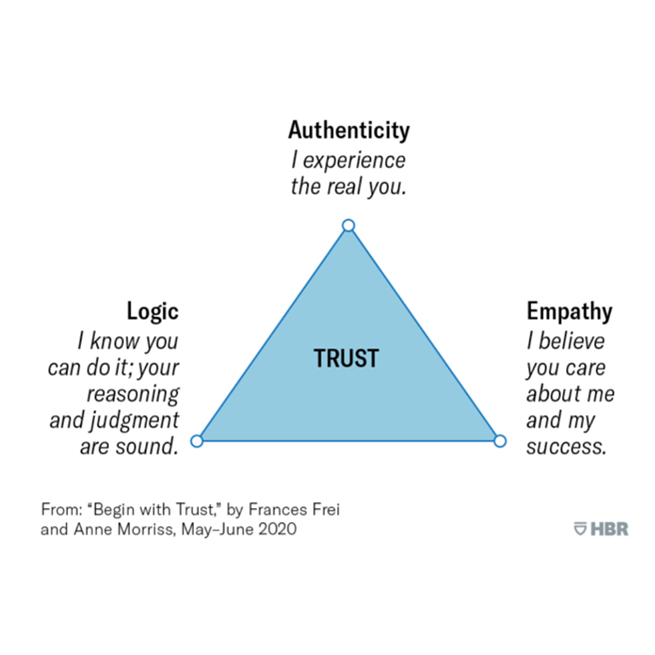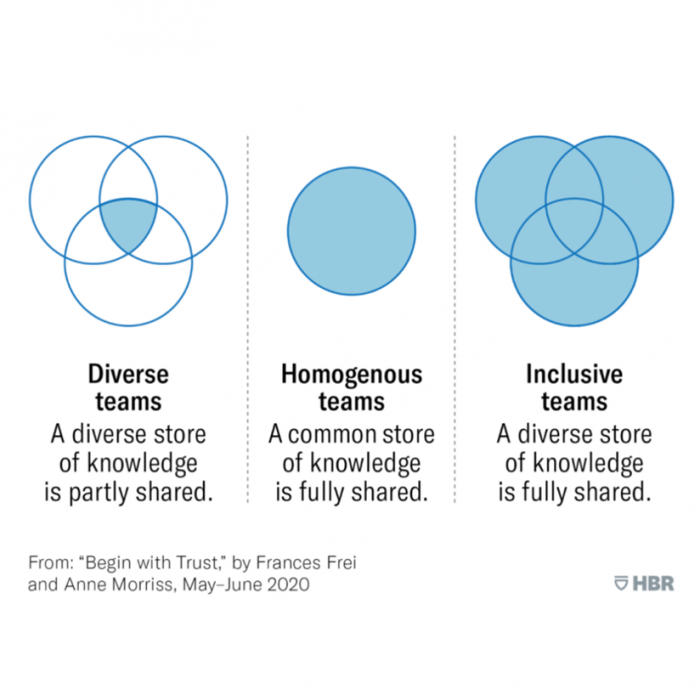Did you know that 50% of CEOs worldwide consider lack of trust to be the major threat of their organisational growth? Yet, discussions about business growth mainly involve marketing insights, strategic market positioning, digitalisation of products and processes and sales efforts.
Start with building and measuring trust and growth will come.
I was working with a business leader, let’s call her Sarah, of a medium-sized creative agency earlier this year. She had plans to double the size of the business within the next 3 years but felt she was getting too heavily involved in the day-to-day business to focus on strategy. Sarah said: ‘My team is good but not good enough to reach the goals we have set’. In our coaching sessions, we focussed on her as a leader. She realised she needed more insights from her team, so we used a 360-feedback tool based on emotional intelligence and we got her whole team involved. As it turns out, there was a lack of trust in the agency’s work environment.
Her team members, all highly qualified individuals, felt that Sarah is an inspiring leader but that she would often lose her temper when stressed and would be quick to look for blame. They also said that she would sometimes shut people down in meetings which created fear within the team to contribute. And thirdly, they appreciate her high expectations, but she had little regard for the challenges individuals had, especially during the difficult lockdown times in 2020.
Reviewing the feedback with Sarah gave her a renewed perspective of what was holding the business back from growing. She realised that, in fact, her team has the potential to lead the growth, but she needed to build trust and empower them. The problem lay in the interactions she had with her team members, not their lack of talent.
The Trust Triangle
I used this simple trust framework created by Frances Frei and Anne Morris:

Trust is based on authenticity, empathy and logic in your interactions with others. Authenticity is about being the ‘real you’ and openly and effectively expressing yourself and honouring commitments. Empathy means people feel you care about them, noticing and acknowledging others, ensuring others feel valued and adjusting your leadership style to best fit with others. And thirdly, people trust you when they believe in your judgement, competence and decision making which is ‘logic’.
The ‘wobble’
When there is a lack of trust between individuals, you can almost always find the reason in one of these drivers. For example, for Sarah authenticity and logic weren’t a problem for her team members. They said ‘you never know which Sarah shows up but it’s always the real one.’ They also trusted her decision making and expertise. Where it went wrong, or what Frei and Morris call a ‘wobble’, is empathy. Sarah’s often unproductive way of communicating and lack of emotional intelligence broke the trust and resulted in her team members feeling disempowered, disengaged and stressed. People don’t produce their best work when they are under pressure and feel they don’t have support. Through open conversations, feedback both ways and workshops Sarah changed her approach and fixed the ‘empathy wobble’. She now uses a coaching approach in her interactions with her team members with a focus on their development and a deep believe in their capabilities to lead the growth.
It always starts with Trust
I encourage you to use the trust triangle and check for ‘wobbles’ next time you look at the growth plans for your business or department or your team performance. It always starts with trust and because we all have ‘wobbles’ from time to time, this is an easy way to focus on your own leadership first before pointing the finger at others.
Trust in teams
Whilst building trust and evening out ‘wobbles’ in your one-on-one interactions is important to empower your team members, paying it forward and enabling your whole team to build a high level of trust will make the difference between a good team and high performing team. In diverse teams especially, we need to create a collective trust that allows team members to bring in their unique perspective and experiences. This is when you have an Inclusive Team:

A good indicator for what it looks like when trust in your team is present:
- team members are unguarded with one another
- they are open about challenges and admit mistakes
- they ask for help and collaborate
- they have no reason to be careful and show vulnerability
- they take risks and make courageous decisions
- they hold each other accountable and have each other’s backs
Here are 7 effective ways to build trust within your team:
- Assume best intention. We need to ‘trust by default’ and believe that everyone is working hard and trying their best. Of course, we measure output and give feedback, but we start with believing that people are here to do the right thing.
- Care personally and be empathetic. This is such a ‘no brainer’ but especially in times when people are stressed and under pressure, we need to dial up our empathy level. This is particularly hard for leaders who are task and logic-focussed. Take your time to understand what is going on with your team member. Ask questions like: ‘What do you need from me right now so you are ok/can move on/take the next step…’ It’s about learning to find out what their fears and motivators are to help them realise their potential.
- Overcome interpersonal differences. People have different natural behaviour styles. Move from judging people: ‘He is too slow and detail focussed’ to valuing their natural high preference: ‘His ability to slow down the process and make the right decision instead of a fast one adds a lot of value to the team’.
- Create psychological safety. Create an environment where every idea is valued, no matter how crazy. Encourage team members to ask questions and ask for help. Start by admitting your own mistakes so others follow suit. Check out my blog about psychological safety in high performance teams
- Transparent and consistent communication. Cascade information from the top consistently. People want to know what the company is doing, where it’s going and how they will be impacted. A recent Gallup survey showed that daily communication with direct reports measurably improved workforce engagement. If you feel a lack of trust in the team, talk openly about fear and trust and make it a business topic.
- Set expectations, give feedback, hold accountable. Our job as leaders is guide people. Yes, it is to empower them, but they need to know what they are empowered for. There is nothing worse than receiving vague instructions with no purpose or outcome. If you don’t hold people accountable for what you expected them to do, you will probably discover an ‘authenticity trust wobble’.
- Coaching approach. Humans are ‘advice giving maniacs’. Use a coaching approach and ask open questions that make your team members think for themselves. Put the focus back on them and help them to solve the problem or come up with a solution. Coaching people is the most powerful form of leading people to build trust and empower them.
Don’t be afraid of the ‘wobble’, simply create awareness of when a lack of trust is at play and tap into one of the above strategies to create engaging work cultures.
If you want to work with me, email me at info@intactteams.com








